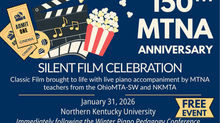OhioMTA-SW Program Meeting on Teaching Neurodivergent Students, 1/13/23, Anderson Center, Cincinnati
- omtasw
- Feb 22, 2023
- 3 min read
Featuring Kelsey Wiggs, Jessica Boone, Stephanie Sepate, and Terry Granick
Written by Elizabeth Swift, Vice President of Programming

Dr. Wiggs is a post-doctoral Research Fellow at Cincinnati Children’s Hospital, specializing in the predictors, correlates, and treatment of ADHD and related difficulties. She also conducts ongoing research related to autism spectrum disorder, and mindfulness. We were so grateful to learn from her vast knowledge. Jessica Boone, Stephanie Sepate, and Terry Granick all brought their unique experience and expertise in working with music students on the autism spectrum, as well as students with dyslexia, to provide teachers with a relevant and useful class. The educational morning armed our teachers with actionable tips and ideas.
The information below is taken from handouts given at the meeting, and notes from teachers in attendance. To dive deeper, click on one of the links at the bottom of the post. Thanks for reading.
ADHD
Types of ADHD
Inattentive (student has lack of attention to details, careless mistakes, doesn’t seem to listen when spoken to, doesn’t follow through or complete tasks, difficulty sustaining attention)
Hyperactivity-Impulsivity (often fidgets, squirms, or taps, leaves seat or feels restless, runs and climbs at inappropriate times, unable to play quietly, talks excessively, interrupts)
Combination of the above
5 General Intervention Tips for students with attention-related difficulties
Praise
Immediate and small rewards for positive actions
Clear instructions
Structure
Routine
Executive Function Skills that can suffer when students have ADHD
Task initiation
Organization
Working Memory
Planning/Time Management
Self-control, self-monitor
Emotional control
Flexibility
Think of these interest-based nervous system traits as positive attributes when planning your lessons:
Interest (what does your student already enjoy?)
Competition (what will motivate your student to participate?)
Novelty (what will work today to grab your student’s focus?)
Urgency (how can you kickstart your student’s productivity without waiting until the last hour?)

Autism Spectrum Disorder
Key Ideas to help set your student-teacher relationship up for success
Communication with parents (either parents letting teachers know about known differences, or teachers bringing observations to parents’ attention)
Evaluation (of abilities of student, keep expectations realistic and fluid)
Compassionate support (for developing verbal and non-verbal communication skills
Consideration for child’s unique preferences (comfort colors, safe place in their imagination, stuffed animal, stimming and use of fidget toys and manipulatives)
Parent Involvement (during practice and home support, plus sharing coping skills that work)
Routine (extremely important for smooth productive lesson)
Appropriate Materials (selected for limited movement, use of 5-finger positions, patterns)
6 Sensory Triggers to be aware of
Clutter
Pets
Lack of adequate lighting
Smells, like lotions and candles
Unexpected changes in routine
Loud noises
Suggestions for setting your ASD lesson up for success
(remember to focus on planning and communication)
Be close enough to student that they can see you (and not feel like they’re being watched)
Only have 1 page of music on the music rack at a time, or one line at a time for harder selections
Give instructions one step at a time
For younger students use props and toys you can add on to to track repetitions
Mark the music in color: skips, steps, etc.
Use positive reinforcement to reward staying on task, like points, stickers, treats
Break down difficult sections into smaller components, like chords, intervals, dynamics
Transitions during the lesson can be difficult-navigate with care
Written practice instructions, especially checklists
Watch for frustration level and change course to affirmation as needed
Teachers of students with neuro-diverse characteristics need to be flexible and willing to try new strategies, such as:
Allowing extra time for student sharing
Moving laterally in repertoire and method books for a sense of progress
Using just one or two books at home and in lessons
Using adult learner books with fewer distractions/graphics
Trying a multi-sensory approach like using visual aids instead of pure memorization
Editing/arranging pieces to make them more accessible for your student
Employing a building block approach to simplify new concepts
Dyslexia
Students with dyslexia have an operating system that works differently and also often struggle with:
Language stored in brain that doesn’t always “translate"
Phonological processing of what the student hears
Weak or slower working memory
Procedural learning is difficult
Most students, both neurotypical and neurodivergent, love praise! Here are some go-to phrases provided at the meeting.

More information about these topics can be found here:




























Comments